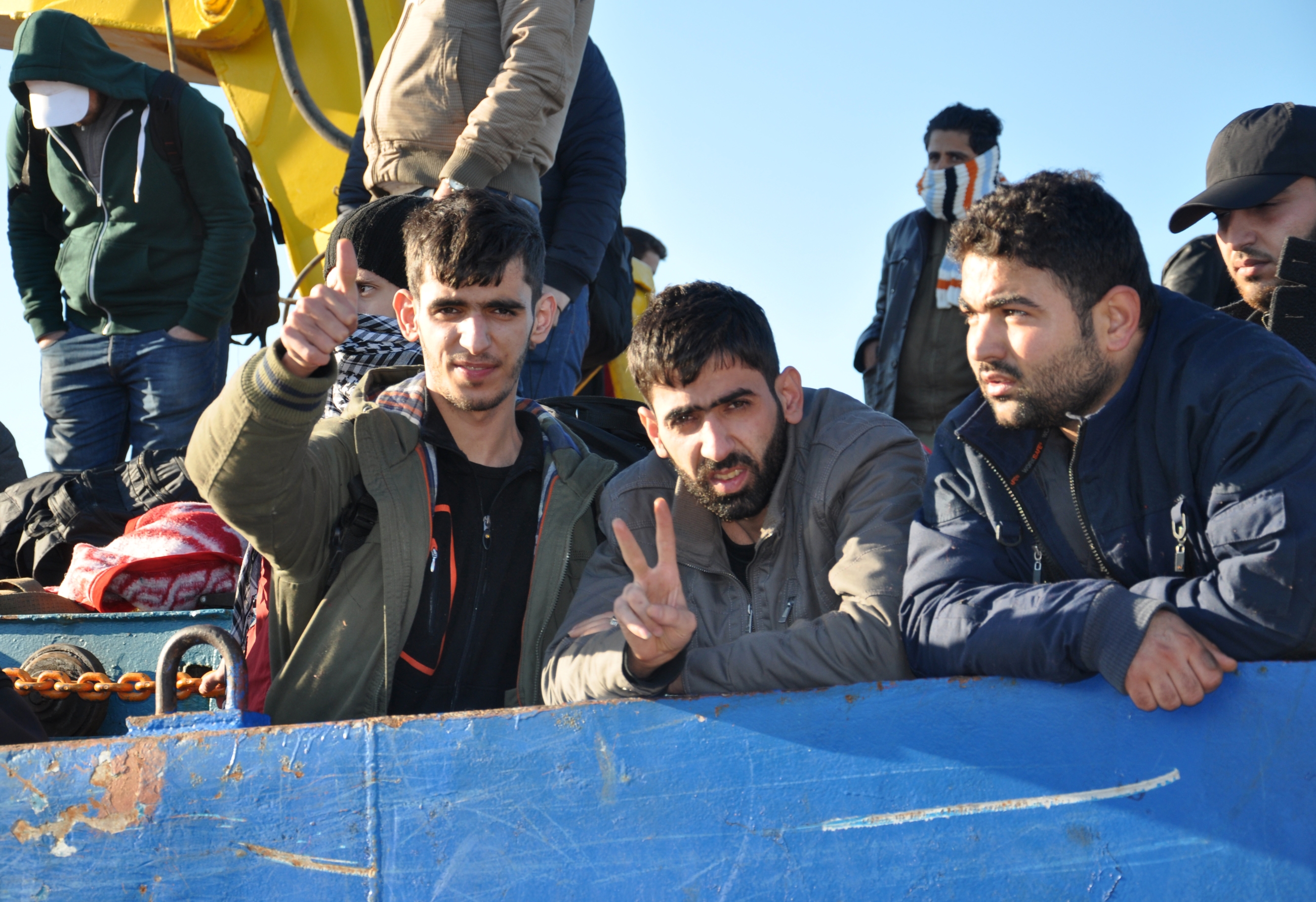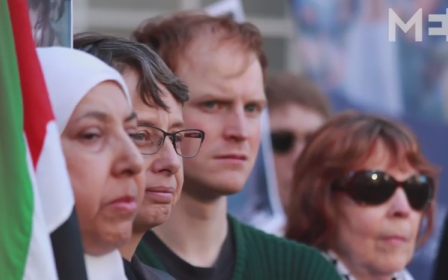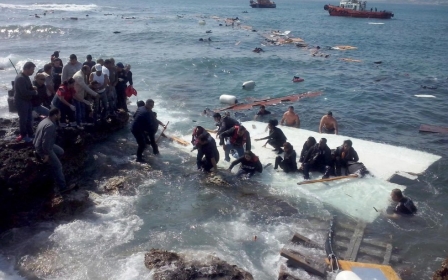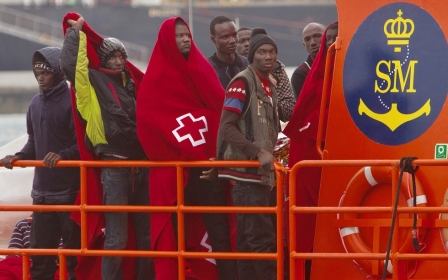A waiting room to the future: Palestinians stranded in Cyprus

Um Abdullah is half-way through recounting her journey from Yarmouk camp to Cyprus, sitting in a cafe on Nicosia’s "Arab Street".
“All the men on the boat were shouting "Allahu akbar! Allahu akbar!" [God is great] but I was wondering why,” she said, describing a moment when it appeared the boat she was on might sink. “I thought our ship could still make it to Italy.”
Last September, Um Abdullah was one of more than 350 Syrian and Palestinian-Syrian refugees on an Italy-bound boat from Turkey. After days at sea, the boat’s engine failed, leaving them pitching from side to side in unpredictable autumn seas. The ship’s captain made a distress signal and they were eventually rescued by a Cypriot cruise ship.
For months now, everyone from “the boat”, so-called because such an arrival in Cyprus is so rare, have been living in protracted temporariness on the island; each one struggling somewhere between asylum policies, "Fortress Europe" and the smugglers.
Unwilling to stay but unsure how to leave, Um Abdullah is still conflicted about the rescue. “I never felt our boat was in the middle of danger,” she said. “Maybe we shouldn’t have asked for help from the cruise ship? Maybe we should have just carried on?”
New MEE newsletter: Jerusalem Dispatch
Sign up to get the latest insights and analysis on Israel-Palestine, alongside Turkey Unpacked and other MEE newsletters
No one wanted to come to Cyprus. “There is no future for us in Cyprus,” she said. “Here, it’s like a station…just somewhere until we find a way to go out.”
As Um Abdullah speaks, a young guy who goes by the name Brince is hanging around on the Arab Street outside. He’s been using the courtyard in the nearby Al-Omeriye Mosque to offer refugees something he unconvincingly calls a “global passport,” advertised on an A4 print-out. It’s a reminder of the meagre options left to refugees desperate to find stability around the Mediterranean.
Za’atar sandwiches at the Sunday school
In one of Nicosia’s southern suburbs, a tawdry landscape furnished with newsagents and empty bank buildings, there is a church above a bathroom fittings studio. Here up to 60 Palestinian-Syrians from the boat are lying in wait for a new life after being dumped in Nicosia by the authorities, following the closure of Kokkinotrimithia, an emergency facility set up to house the refugees from the boat in tents during the winter months.
“Cyprus is a temporary place,” said Shady, a 33-year-old Palestinian and former pharmacist, who fled Yarmouk wanted by the regime and then the Damascus countryside wanted by the rebels.
“I never changed my mind since I got here - I will leave Cyprus. [Since leaving Syria] I’ve lived all these years in uncertainty, always thinking: ‘What happens now? What will happen tomorrow?’”
While the smell of za’atar sandwiches cooking in a microwave works its way around the room, families sit around in the church hall, waiting. A room that used to house Sunday school classes has become a full-blown refuge. Mattresses and bags line the walls. The corner of one of the makeshift dormitories is a tangle of phone chargers and crinkled packets of tobacco.
This is just one of thousands of tucked-away, temporary spaces created by irregular migration on Europe’s borders. Right now, around the Mediterranean, refugees like Shady are sitting and waiting in Libyan detention facilities and Egyptian police stations, camps and reception centres, apartments and smuggling warehouses; anywhere and everywhere that might serve as a waiting room to the future.
Shady, like most people in the church, is refusing to apply for asylum. But around 60 people from the boat have accepted that their journeys are over and registered, according to the Nicosia-based Future Worlds Centre, a UNHCR-funded organisation that assists refugees and asylum seekers in Cyprus through legal advice and asylum assistance. Many are now staying in the island’s only state-run reception centre, Kofinou.
However, according to a new Asylum Information Database (AIDA) report by the Future Worlds Centre and the Brussels-based European Council on Refugees and Exiles (ECRE), 65 percent of asylum applicants received subsidiary protection (rather than full refugee status), a kind of second-tier system that does not guarantee asylum seekers protection from expulsion or the right to family reunification, following a controversial April 2014 amendment by the Cypriot authorities.
Everyone in the church wants family reunification. Many have family still in Syria; some of them still in Yarmouk.
For Shady, Cyprus is just more uncertainty. If he applies for asylum, will he be able to find work, or get his wife out of Syria? He doesn’t think so.
“I can’t make anything of my life in this country,” he said.
Yahya al-Shehabi is a 70-year-old former UNRWA teacher from Yarmouk camp. Shehabi is worried that if he applies for asylum, but then receives subsidiary protection, he will not be able to get his wife out of Syria. He says she needs medical attention for a blood pressure condition.
“If I can’t make family reunification and see my wife, how am I meant to live with this?” he asked.
His odds are not good. In 2013, excluding one Syrian who was given full refugee status, all refugees fleeing Syria to Cyprus were given subsidiary protection. In 2014, that number rose to four cases (including one Palestinian family from Yarmouk).
Head of the Cypriot Asylum Service, Makis Polydorou, remains unphased by claims that the Cypriot system is inadequate.
“[Giving] international protection means refugee status or subsidiary protection. Their rights are almost equal,” he claimed. “We enforce a single procedure.”
But Corina Drousiotou, the report’s co-author and head of the humanitarian affairs unit at the Future Worlds Centre, disagrees. She told Middle East Eye why subsidiary protection makes asylum so unattractive to refugees fleeing the Syrian conflict.
“This has been a deterrent for people arriving on the boat from applying…because in Cyprus, refugee status and subsidiary protection have two differences in terms of the rights afforded,” she said. Those receiving full refugee status get the right to family reunification, as well as a travel document. Others with subsidiary protection instead receive a laissez passer (a humanitarian visa with limited travel options) and no family reunification. “[This] is important because a lot of the refugees include single men…who came alone, or unaccompanied children who were sent in order to pull the family.”
Polydorou instead argues that refugees are trying to leave because they are being spurred to do so by civil society. “Some NGOs try to convince them that Cyprus is violating the rights of refugees,” he claimed. “We were ready to satisfy [the refugees], but they had to choose.”
But long after the boat, Shehabi feels he has no real choice. He waited six months for an alternative that never came. “My wife is still in Syria and she’s sick. I have no option left. So maybe I will apply for asylum this week,” he said. Facing one decision with immense implications, all Shehabi can do now is hope.
‘God willing, I will try again’
Like everywhere in the Mediterranean, smugglers offer an alternative — not all of them as unconvincing as Brince and his “global passport.” In Cyprus, many have tried several attempts to get off the island.
Foaud, a 22-year-old Palestinian from Yarmouk, has tried to travel on several occasions. Three of his brothers reached Europe last year via boats from Egypt, Libya or Turkey.
Inside Kokkinotrimithia, one of the refugees from the boat, known as Abu Mahmoud, started operating as a simsar (broker) on behalf of a Syrian-Kurdish smuggler across the border. He was offering a flight to Europe for 5,000 euros.
“In the camp, [Abu Mahmoud] was talking to the people and saying he had a trip by aeroplane to Belgium,” Foaud said. “I never believed it, from the beginning. But when I saw the people going in for this, asking about it, I followed.”
After leaving Kokkinotrimithia, Abu Mahmoud started telling the group he was being hounded by the authorities, so transferred all the money to the smuggler in the north. The money disappeared, probably to Turkey. Both men were later arrested but much of the refugees’ money has gone and, with it, another route off the island.
Foaud lost thousands. “I signed for this trip,” he said, glancing at the floor, “and Abu Mahmoud took $9,000.” But he is still undeterred. “God willing, I will try again if I get the opportunity.”
A convoluted route to Europe
Another smuggler on the north side of the island is currently holding thousands of euros (1,200 per person) meant to take the refugees to Turkey once again. Some of the group purportedly reached Turkey by boat with Aly’s help weeks ago. That news is keeping the plan alive back in the church.
Thanks to temporary residency granted to the refugees through a Cypriot visitors’ visa, meant to legalise their stay according to the country’s Aliens and Immigration Law, the Palestinians do not need a pre-arrival visa to enter a particular Balkan state, and they can use emergency passports given to them previously by the Palestinian Embassy in Cyprus to travel - providing they book a return flight and can prove to immigration in eastern Europe that they are only visiting.
It is a convoluted route and no guarantee of success. Still, some have made it. Around a dozen of the Palestinians from the church are thought to have successfully reached mainland Europe this way.
Shady has already tried to leave the country twice - once on a fake passport that he bought from a smuggler (although the picture looked nothing like him); and a second time, by flying to the Balkans.
“I tried to go…three weeks ago,” he told Middle East Eye. “I asked the embassy here: ‘Do I need a visa?’ and they said no. I asked the airline: ‘Do I need a visa?’ and they said no. So I bought my ticket. And then when I got to the airport, they called immigration in [eastern Europe] and they said: ‘He needs a visa.’”
Those that fail often return to the church, to questions and commiserations and jokes.
Mahmoud, another Palestinian from Yarmouk in his twenties, remembers standing outside the airport after his rejection.
“I remember these three girls walked past - they were about to get on a plane,” he said, smiling. “Then I saw they had these baskets…they were for their dogs, and they were taking them on the plane, too.”
Shady joins in. “So their dogs can fly to Europe, while we get thrown out of the airport, like Palestinians?”
Everyone laughs for a moment, then there is silence.
This article is available in French on Middle East Eye French edition.
Middle East Eye delivers independent and unrivalled coverage and analysis of the Middle East, North Africa and beyond. To learn more about republishing this content and the associated fees, please fill out this form. More about MEE can be found here.




